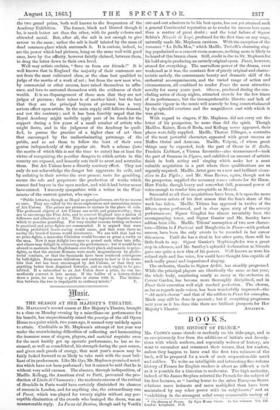THE SEASON AT HER MAJESTY'S THEATRE. Mn. MAPLESON'S second season
at Her Majesty's Theatre, brought to a close on Monday evening by a miscellaneous performance for his benefit, has unquestionably raised the prestige of the old Opera House to a point which, two years ago, it seemed very unlikely again to attain. Creditable as Mr. Mapleson's attempt of last year was under the overwhelming difficulties of collecting and harmonizing the immense mass of singers, players, and materiel requisite even for the most hastily got up operatic performance, he has so in- creased, as well as consolidated, his strength during the past season, and given such proofs of energy, that next year's season may be fairly looked forward to as likely to take rank with the most bril- liant of its predecessors. Like Mr. Gye, Mr. Mapleson promised novel, ties which have not been performed ; but it cannot be said that he is without very solid excuses. The absence, through indisposition, of Madlle. Kellogg, the American rival to Patti, prevented the pro- duction of Linda di Chamounix ; the moderate success of the revival of Stradella in Paris would have certainly diminished its chances of success in London, and for anything else, the extraordinary run of Faust, which was played for twenty nights without any per- ceptible diminution of the crowds who besieged the doors, was an unanswerable reply. La Forza del Destino, though said by Verdi's
out-and-out admirers to be his best opera, has not yet attained such a general Continental reputation as to render its success here more than a matter of great doubt ; and the total failure of Signor Schira's Niccolb de' Lapi, produced for the first time on any stage, naturally made Mr. Mapleson cautious. With the exception of the romance "La Bella Mea," which Madlle. Trebelli's charming sing- ing popularized as a concert-room morceau, nothing more is likely to be heard of this brazen chaos. Still, credit is due to Mr. Mapleson for his bold step in producing an entirelyoriginal opera. Faust, however, atoned for everything. The marvellous power of the drama, even weakened as it was, the constant flow of purely original and charac- teristic melody, the consummate beauty and dramatic skill of the orchestral accompaniments, and the varied range of action and circumstances, all combined to render Faust the most attractive- novelty for many years past. Oberon, produced during the con- cluding series of cheap nights, attracted crowds for the few times of its performance, but the incomprehensible libretto and lack of dramatic vigour in the music will scarcely be long counterbalanced by the splendid overture and the magnificent cast with which it was given.
With regard to singers, if Mr. Mapleson did not carry out the letter of his prospectus, he more than did the spirit. Though Madlles. Kaiser, Rosa di Ruda, and Kellogg never appeared, their places were fully supplied. Madlle. Therese Ellinger, a contralto of the most powerful character, appeared with great success as Maffeo Orsini and Azucena. Madlle. Volpini, of whom great things may be expected, took the part of Oscar in Ii Ballo. Fraulein Liebhart, a Vienna favourite—also unannounced— took the part of Susanna in Figaro, and exhibited an amount of artistic finish in both acting and singing which make her a most valuable acquisition in a part where these qualifications are so urgently required. Madlle. Artot gave us a new and brilliant vivan- dare in La Figlia ; and Mr. Sims Reeves, again, though not in the prospectus, supplied the necessary tenore robust° for Sir Huon. Herr Fricke, though heavy and somewhat dull, possessed power of voice enough to render him acceptable as Marcel.
Successful as all these acquisitions have been, it is upon the more- well -known artists of his first season that the lion's share of the work has fallen. Madlle. Titiens has appeared in twelve of the fifteen operas performed, and in close upon sixty of the seventy performances ; Signor Giuglini has almost invariably been the accompanying tenor, and Signor Gassier and Mr. Santley have- seldom been idle. Madlle. Titiens' assumption of two new charae- ters—Elvira in I Puritani and Margherita in Faust—with perfect success, have been the only events to be recorded in her career- this season. Until she has a rival in her other parts, there will be little fresh to say. Signor Gassier's Mephistopheles was a great step in advance, and Mr. Santley's splendid declamation as Niccold gave one quite a new idea of his powers. Well known as were his refined style and fine voice, few could have thought him capable of such really grand and impassioned singing.
The orchestra, thanks to Signor Arditi, has steadily progressed. While the principal players are identically the same as last year, the whole body, numbering nearly as many as the orchestra at Covent Garden, has become more thoroughly disciplined, and in Faust their execution well nigh reached perfection. The chorus, as far as regards male voices, has been wonderfully improved—the " old men's chorus" and that of the soldiers in Faust for examples. Much may still be done in spectacle; but if everything progresses next year as it has done this there are brilliant prospects for Her-






























 Previous page
Previous page